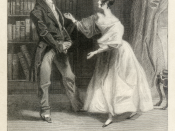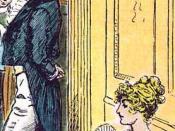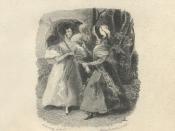The Power of Women
Few women dared to defy societal conventions in the 18th century and remain single despite willing suitors. Jane Austen's willingness to do so showed that she was willing to challenge the role of women in society and culture. In her books she demonstrates this subtly, with characters that aren't conventionally feminist, but express the independent ideals of women. She accomplishes the subtlety through effective portrayal of specific areas of women's lives including money, marriage, and societal prominence. Jane Austen's portrayal of women in the 18th century shows women who act according to the social quota, but who also hold strong independent qualities and promote female rights.
During the late 18th century, women suffered from getting ahead (Sanborn 1). Even if a woman became rich, her money would usually revert to her husband when she married. If something happened to a woman's husband she would more than likely be left with nothing.
However, Jane Austen's characters show themselves competently different in two ways: ability to make do without large sums of money and capable of managing money. Jane Austen shows that money is not the end all objective for happiness. She shows this primarily through the novel Emma. In Emma Austen's main character, Emma, starts out trying to help her friend Harriet achieve money to be happy (Emma 70). With this goal in mind, Emma gets Harriet to refuse her true love, Robert Martin, because he is too poor. She instead attempts to have her marry the wealthy Mr. Elton because she thinks that will bring Harriet happiness. After everything goes wrong, and Harriet marries Robert Martin anyway, Emma realizes that there is more to life than money and social class. Even though she took for granted the true meaning of money, Emma still finds a way...


